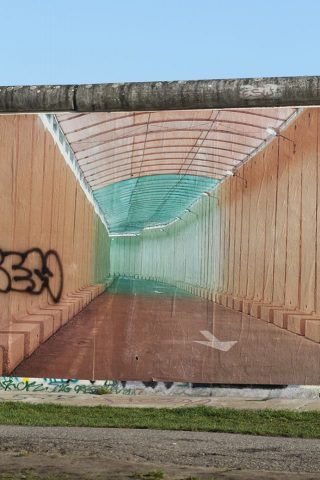This is the time to build walls
It’s time to build a wall. Walls are in right now, a trending topic. A wall solves almost all problems. And if it doesn’t? Make it bigger. A great wall.
The narrative of the wall keeps people safe. It creates corresponding images to the wall in our heads. The others need to be kept out. Our space. Beware of the dog. Access restricted. All good.
But does the wall really change anything?
The great wall of Mexico. The British wall at the Eurotunnel. A Norwegian wall with Russia. Hungary’s fence. Feeling safer already? If that’s not enough, you can always build a higher wall to keep out the neighbours.
We are living in times of dramatic changes and insecurity. People are craving better times. More security. Or at least some sort of clarity on what change is happening to the world around us. The narrative of the wall does not offer solutions, but it offers lazy shortcuts. Keep out what you don’t understand.
At FCA, we are thinking a lot about change. From a global point of view, the changes are indeed substantial. The world is seeing more refugees than ever before in human history. In 2015, 244 million people lived outside their country of origin. That is 40 times the population of Finland.
The world is changing and people are on the move. The scope of the challenge makes it clear that this is not the time of simplified solutions.
We need to ‘complexify’ our worldview, and for that, we need some sort of anti-wall.
 When visiting Ramallah last year, I could not help but be reminded of some of the big walls in history. Including the Berlin Wall, one of the most visible symbols of the Iron Curtain. When the wall fell, even the end of history was proposed. History didn’t end, but the ruins of the Berlin Wall remain a strong symbol for overcoming walls and opening up. Especially as it’s become a picture gallery of other walls around the world.
When visiting Ramallah last year, I could not help but be reminded of some of the big walls in history. Including the Berlin Wall, one of the most visible symbols of the Iron Curtain. When the wall fell, even the end of history was proposed. History didn’t end, but the ruins of the Berlin Wall remain a strong symbol for overcoming walls and opening up. Especially as it’s become a picture gallery of other walls around the world.
We need to overcome the walls in our head. We need to meet the other, to engage the world in all its complexity. A constant demand of increased security only becomes a vicious cycle.
For example those who have been rejected for asylum are suggested to be more prone to join criminal gangs. The claim has entered the public arena without proper or any evidence. In the public discussion we are pushing the one at the ‘borderline of our empathy’ to become an even bigger security risk. Another brick to the wall in our heads.
It’s time to get rid of the wall. Criminals and terrorists will always find their way through. But since when did we build a successful world based on the existence of criminal and extremist ideologies that not even a permille of the world adheres to? A small amount of people should not be able to take the world as hostage.
The first step of breaking down walls starts from our heads. In practice this means re-humanizing our fellow human beings. Meet them. Talk to them. Especially those, who are easily portrayed as a risk, a threat, or a problem. We need to recognize our fear and start living our lives again, a life that’s not dictated by fear.
In his last speech to the UN president Barack Obama said: “Today, a nation ringed by walls would only imprison itself”. The wall narrative demands us to imprison ourselves.
As voluntary prisoners we have a choice to be made.
The writer is Senior Advisor for Right to Peace at Finn Church Aid
Twitter: @sinnwahn

